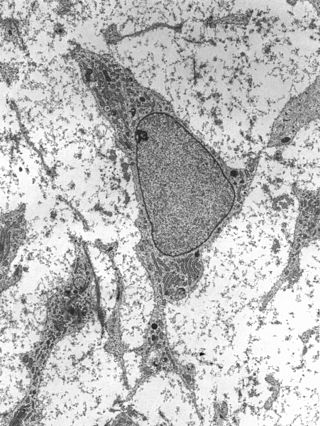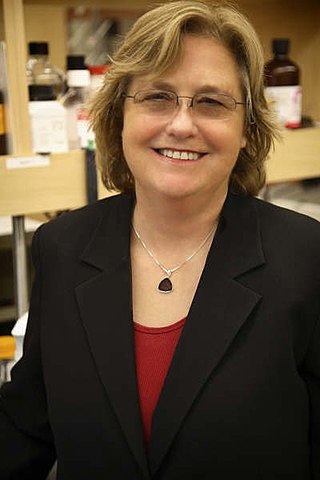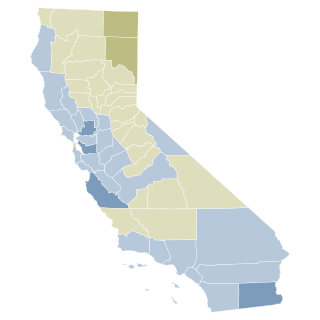
In multicellular organisms, stem cells are undifferentiated or partially differentiated cells that can change into various types of cells and proliferate indefinitely to produce more of the same stem cell. They are the earliest type of cell in a cell lineage. They are found in both embryonic and adult organisms, but they have slightly different properties in each. They are usually distinguished from progenitor cells, which cannot divide indefinitely, and precursor or blast cells, which are usually committed to differentiating into one cell type.
The Electronic Privacy Information Center (EPIC) is an independent nonprofit research center established in 1994 to protect privacy, freedom of expression, and democratic values in the information age. Based in Washington, D.C., their mission is to "secure the fundamental right to privacy in the digital age for all people through advocacy, research, and litigation." EPIC believes that privacy is a fundamental right, the internet belongs to people who use it, and there's a responsible way to use technology.
The California Institute for Regenerative Medicine (CIRM) is a state agency that supports research and education in the fields of stem cell and gene therapies. It was created in 2004 after 59% of California voters approved California Proposition 71: the Research and Cures Initiative, which allocated $3 billion to fund stem cell research in California. In 2020 voters approved Proposition 14 that allocated additional funds to CIRM.

The Wisconsin Alumni Research Foundation is the independent nonprofit technology transfer organization serving the University of Wisconsin–Madison and Morgridge Institute for Research. It provides significant research support, granting tens of millions of dollars to the university each year and contributing to the university's "margin of excellence".
In November 2004, voters in the U.S. state of California passed Proposition 63, the Mental Health Services Act (MHSA), which has been designed to expand and transform California's county mental health service systems. The MHSA is funded by imposing an additional one percent tax on individual, but not corporate, taxable income in excess of one million dollars. In becoming law in January 2005, the MHSA represents the latest in a Californian legislative movement, begun in the 1990s, to provide better coordinated and more comprehensive care to those with serious mental illness, particularly in underserved populations. Its claim of successes thus far, such as with the development of innovative and integrated Full Service Partnerships (FSPs), are not without detractors who highlight many problems but especially a lack of oversight, large amount of unspent funds, poor transparency, lack of engagement in some communities, and a lack of adherence to required reporting as challenges MHSA implementation must overcome to fulfill the law's widely touted potential.

Geron Corporation is a biotechnology company located in Foster City, California which specializes in developing and commercializing therapeutic products for cancer that inhibit telomerase.

Proposition 71 of 2004 is a law enacted by California voters to support stem cell research in the state. It was proposed by means of the initiative process and approved in the 2004 state elections on November 2. The Act amended both the Constitution of California and the Health and Safety Code.

California Proposition 87 was a proposition on the ballot for California voters for the November 7, 2006 general election, officially titled Alternative Energy. Research, Production, Incentives. Tax on California Oil Producers. It was rejected by the voters, 54.7% opposed to 45.3% in favor. This was highest-funded campaign on any state ballot and surpassing every campaign in the country in spending except the presidential contest.

California's state elections were held November 2, 2004. Necessary primary elections were held on March 2. Up for election were all the seats of the State Assembly, 20 seats of the State Senate, and sixteen ballot measures.
Consumer Watchdog is a non-profit, progressive organization which advocates for taxpayer and consumer interests, with a focus on insurance, health care, political reform, privacy and energy.
Lana Skirboll is the former director of the National Institutes of Health Office of Science Policy.

Harvey Rosenfield is an American lawyer, author and consumer advocate. In 1985, he founded Consumer Watchdog, a nationally recognized, nonpartisan nonprofit public interest group. He serves as the group's counsel.

Jamie Court is an American author, political activist, lobbyist, and consumer advocate. He serves as president of Consumer Watchdog, a nationally recognized nonprofit public interest group.

James Pearson Steyer is an American civil rights attorney, professor, and author. He founded Common Sense Media, an organization that "provides education and advocacy to families to promote safe technology and media for children."
Consumer Watchdog vs. Wisconsin Alumni Research Foundation is a case focusing on an appeal filed by Consumer Watchdog (CW) to invalidate a patent held by the Wisconsin Alumni Research Foundation (WARF) regarding the in vitro cell culture of human embryonic stem cells (hESCs). This case is still currently ongoing in the U.S. Court of Appeals for the Federal Circuit and is the latest in a series of attempts by CW to revoke one of the three patents held by WARF on hESCs.
Campaign for Accountability (CfA) is a liberal 501(c)(3) non-profit ethics watchdog group headquartered in Washington, D.C. CfA was co-founded in May 2015 by Anne Weismann, former legal counsel for the watchdog group Citizens for Responsibility and Ethics in Washington (CREW), and Louis Mayberg, former chairman of CREW. CfA group states that it "uses research, litigation and aggressive communications to expose misconduct and malfeasance in public life."

Jeanne Frances Loring is an American stem cell biologist, developmental neurobiologist, and geneticist. She is the founding Director of the Center for Regenerative Medicine and emeritus professor at the Scripps Research Institute in La Jolla, California. She has founded two biotechnology companies, Arcos BioScience (1999) and Aspen Neuroscience (2018)

The California state elections in 2020 were held on Tuesday, November 3, 2020. Unlike previous election cycles, the primary elections were held on Super Tuesday, March 3, 2020.

California Proposition 14 is a citizen-initiated ballot measure that appeared on the ballot in the 2020 California elections, for November 3, 2020. It authorizes state bonds to be issued worth $5.5 billion, which will fund the California Institute for Regenerative Medicine (CIRM), which serves as the state's center for stem cell research, and enable it to continue its operations. This measure passed with 51% of the vote.

The California Privacy Rights Act of 2020 (CPRA), also known as Proposition 24, is a California ballot proposition that was approved by a majority of voters after appearing on the ballot for the general election on November 3, 2020. This proposition expands California's consumer privacy law and builds upon the California Consumer Privacy Act (CCPA) of 2018, which established a foundation for consumer privacy regulations.










